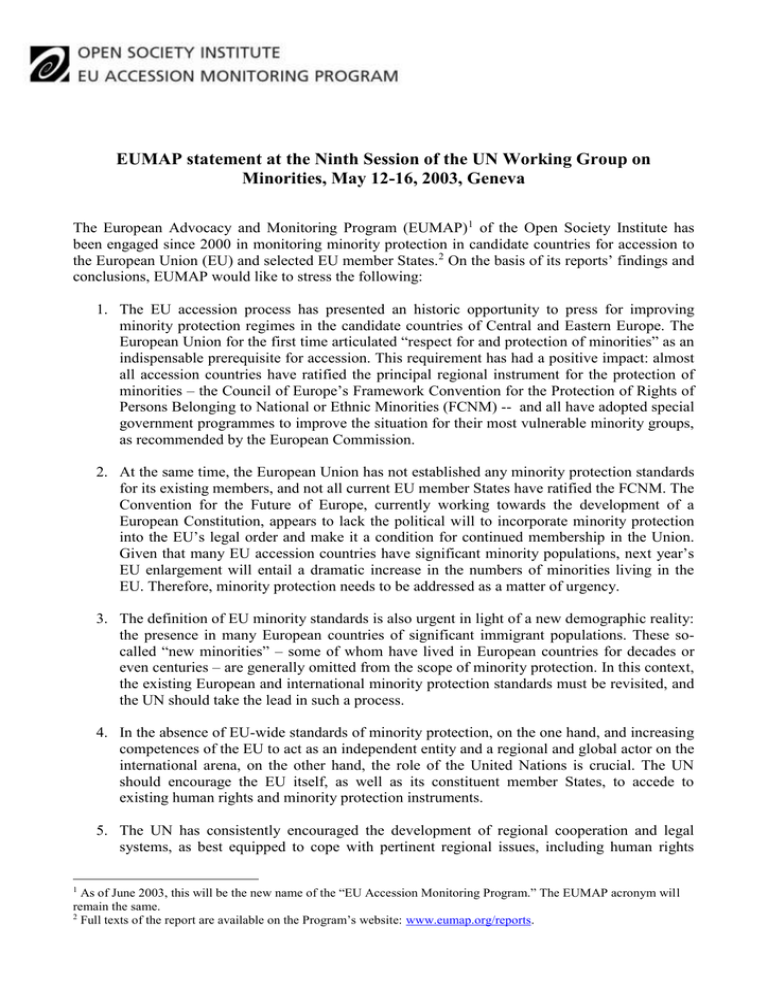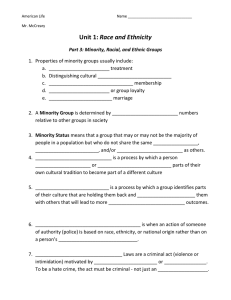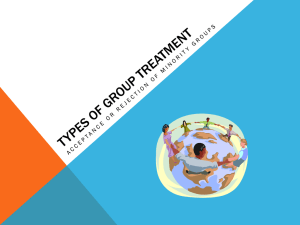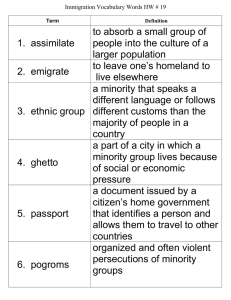EUMAP statement at the Ninth Session of the UN Working...
advertisement

EUMAP statement at the Ninth Session of the UN Working Group on Minorities, May 12-16, 2003, Geneva The European Advocacy and Monitoring Program (EUMAP)1 of the Open Society Institute has been engaged since 2000 in monitoring minority protection in candidate countries for accession to the European Union (EU) and selected EU member States.2 On the basis of its reports’ findings and conclusions, EUMAP would like to stress the following: 1. The EU accession process has presented an historic opportunity to press for improving minority protection regimes in the candidate countries of Central and Eastern Europe. The European Union for the first time articulated “respect for and protection of minorities” as an indispensable prerequisite for accession. This requirement has had a positive impact: almost all accession countries have ratified the principal regional instrument for the protection of minorities – the Council of Europe’s Framework Convention for the Protection of Rights of Persons Belonging to National or Ethnic Minorities (FCNM) -- and all have adopted special government programmes to improve the situation for their most vulnerable minority groups, as recommended by the European Commission. 2. At the same time, the European Union has not established any minority protection standards for its existing members, and not all current EU member States have ratified the FCNM. The Convention for the Future of Europe, currently working towards the development of a European Constitution, appears to lack the political will to incorporate minority protection into the EU’s legal order and make it a condition for continued membership in the Union. Given that many EU accession countries have significant minority populations, next year’s EU enlargement will entail a dramatic increase in the numbers of minorities living in the EU. Therefore, minority protection needs to be addressed as a matter of urgency. 3. The definition of EU minority standards is also urgent in light of a new demographic reality: the presence in many European countries of significant immigrant populations. These socalled “new minorities” – some of whom have lived in European countries for decades or even centuries – are generally omitted from the scope of minority protection. In this context, the existing European and international minority protection standards must be revisited, and the UN should take the lead in such a process. 4. In the absence of EU-wide standards of minority protection, on the one hand, and increasing competences of the EU to act as an independent entity and a regional and global actor on the international arena, on the other hand, the role of the United Nations is crucial. The UN should encourage the EU itself, as well as its constituent member States, to accede to existing human rights and minority protection instruments. 5. The UN has consistently encouraged the development of regional cooperation and legal systems, as best equipped to cope with pertinent regional issues, including human rights As of June 2003, this will be the new name of the “EU Accession Monitoring Program.” The EUMAP acronym will remain the same. 2 Full texts of the report are available on the Program’s website: www.eumap.org/reports. 1 issues. The Council of Europe’s FCNM (adopted as a regional implementing instrument to the 1992 UNGA Declaration on the Rights of Minorities) is an example of the positive potential of UN influence on standard-setting in the realm of minority protection. The UN should continue developing and refining its own minority protection standards and regimes, as a means to encouraging a parallel development at the European level, and in other regions.



